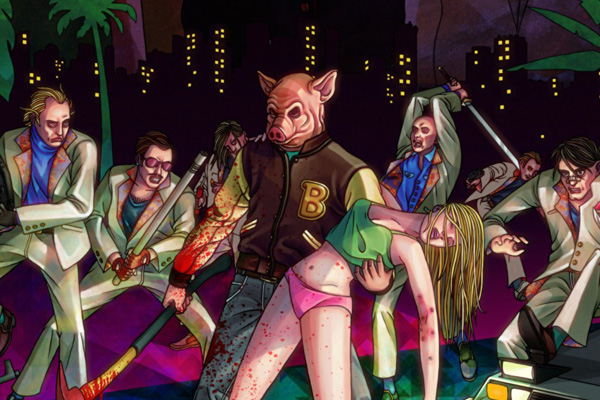@Sargus said:
@DevWil said:
Finally, movies and games aren't the same, and appealing to violent movies doesn't impress me anyway.
I have two questions:
1) Yeah, it's obvious that games aren't movies, but what differences between the mediums matter in this specific case? Is it the interactivity? What would make Hotline Miami "different" in terms of violence than Pulp Fiction?
2) Do you ever think that violence in more "high-brow" violent movies is justified? If not, then completely different arguments need to be made, and regardless I respect your opinion, even if I disagree. But if you think that movies should be able to get away with things that games shouldn't, I have to ask: Why? Because I think they're very comparable in many ways.
I personally think that, while glorifying violence is not something I promote and it's something that makes me uncomfortable (it's part of the reason I've never played the Manhunt games. They may have some merit, somewhere, but I just can't handle them), I think it can be done well and respectfully in both movies and games. If you disagree, that's OK, but I also think your rant disregards some of the "smarter" uses of violence as a storytelling or gameplay device.
I say this especially because, according to your profile, you play a lot of Counter Strike. To me, that seems like a more glorified version of violence than, say, Grand Theft Auto. Because at least in GTA the game acknowledges that you're doing crime and your character is not a good person. CS doesn't address that at all.
Yes, the fundamental difference between a game and a movie is the difference between doing and watching.
I think that violent content in games and other media can totally be justified.
But here's the thing with Hotline Miami: I think it'd be way more successful if it were just a short (like, 10 minutes or less) game in which you do some awful stuff to people and then are forced to reflect on it, and that's the entire arc of the game. However, the fact that the game asks you to do it over and over again (in the name of fun) really deflates any arguments for it being a strong commentary on violence. The reason people keep playing is for the violence, and most of the content really seems to be celebrating violence.
Regarding Counter-Strike... I played Global Offensive a lot when it first launched, but not so much lately. I see a couple of big differences between CS: GO and Hotline Miami: the former is multiplayer and the violence is much better contextualized, I think. In fact, I think CS: GO actually says some surprising things in its game mechanics. For instance, to play a complete match, you have to embody the roles of both terrorist and counter-terrorist, and I think that's actually very interesting. That's something people tend not to think about (and it's something a lot of people in this thread would discourage me from analyzing...).
In CS: GO, I sort of see through the violence into the play structure underneath, and I think a lot of other people do too. It's not exactly about "shooting people in the head", it's about clicking the left mouse button when my cursor is on the opponent's player model. It becomes much more abstract. The primary interaction of a CS: GO match is not "kill the other team". It's not even "destroy/protect the bomb site". It's "win more than half of the possible rounds" (so, win 16 rounds if the halves are 15 rounds each).
However, after playing CS: GO, I can notice myself feeling more irritable and agitated, even if I was playing well and winning. I'm not sure it's a healthy activity.
And I fully appreciate that there's an element of that kind of abstraction in Hotline Miami (many people have talked about the puzzle-like nature of the gameplay), but I don't think it gets away with it to the degree that a game like Counter-Strike can. There's so much attention to detail in modeling the gore and the game itself seems so gleeful about your homicidal ways. The violence never seems like a means to an end for me. It seems like an end in itself.
And, simply put, I think single-player games and multiplayer games are fundamentally different. In a game of Counter-Strike, anonymous as the interactions may be, you are arguably engaged in a social activity. Similarly, we can look at a chess match and say that the two players aren't at war with one another (despite chess's militaristic content), but rather they're simultaneously collaborating and competing. They both want a challenging experience, and they know they depend on the other player for that. A grand master wouldn't want to play against me, because he would win too easily.
On the other hand... I'm developing a strong distaste for single-player experiences, at least in the way they're typically designed.
This is going to sound like an exaggeration, but bear with me:
Most single-player computer games are about obsessively killing cartoon characters.
Am I really that far from the truth in saying that?
Is that really what we want to do with our time? For me, the answer is no, and I don't see the point in playing Hotline Miami if the main point is to get as many red pixels of blood out of as many animated characters as I can. The eeriness might very well be effective, but it's entirely secondary when considering the broader experience of playing the game (as far as I can tell).
And, while this isn't directly related to the rest of what I've written here:
I've read another review of the game since my original post. Eurogamer gave the game a 10/10, and I'm still left uncertain as to why it's good. Here are some excerpts:
"There is no time to think. There is no 'think'."
There's something to be said for gameplay becoming so intense that you're not actually thinking about it (flow, etc), but Tom Bramwell (who wrote the review) spends an awful lot of time actively refusing to actually analyze the game.
"...it's amazing slapstick fun. Stop thinking."
"I don't know why I like the Don - I haven't thought about it."
"It's not haunting or anything like that - this is a silly video game, right?"
This type of "criticism" is exactly what I'm embarrassed about. If a game is fun, we tend not to look at it any closer. If a game isn't fun, we tend not to look at it at all.
If all we want out of our games is for them to be viscerally pleasurable, then we might as well be drug addicts.
And, again, sorry if I'm not responding to anybody's criticism of my words. I'd really like to do so, but it becomes a bit unmanageable. Thanks again for reading and commenting.


Log in to comment